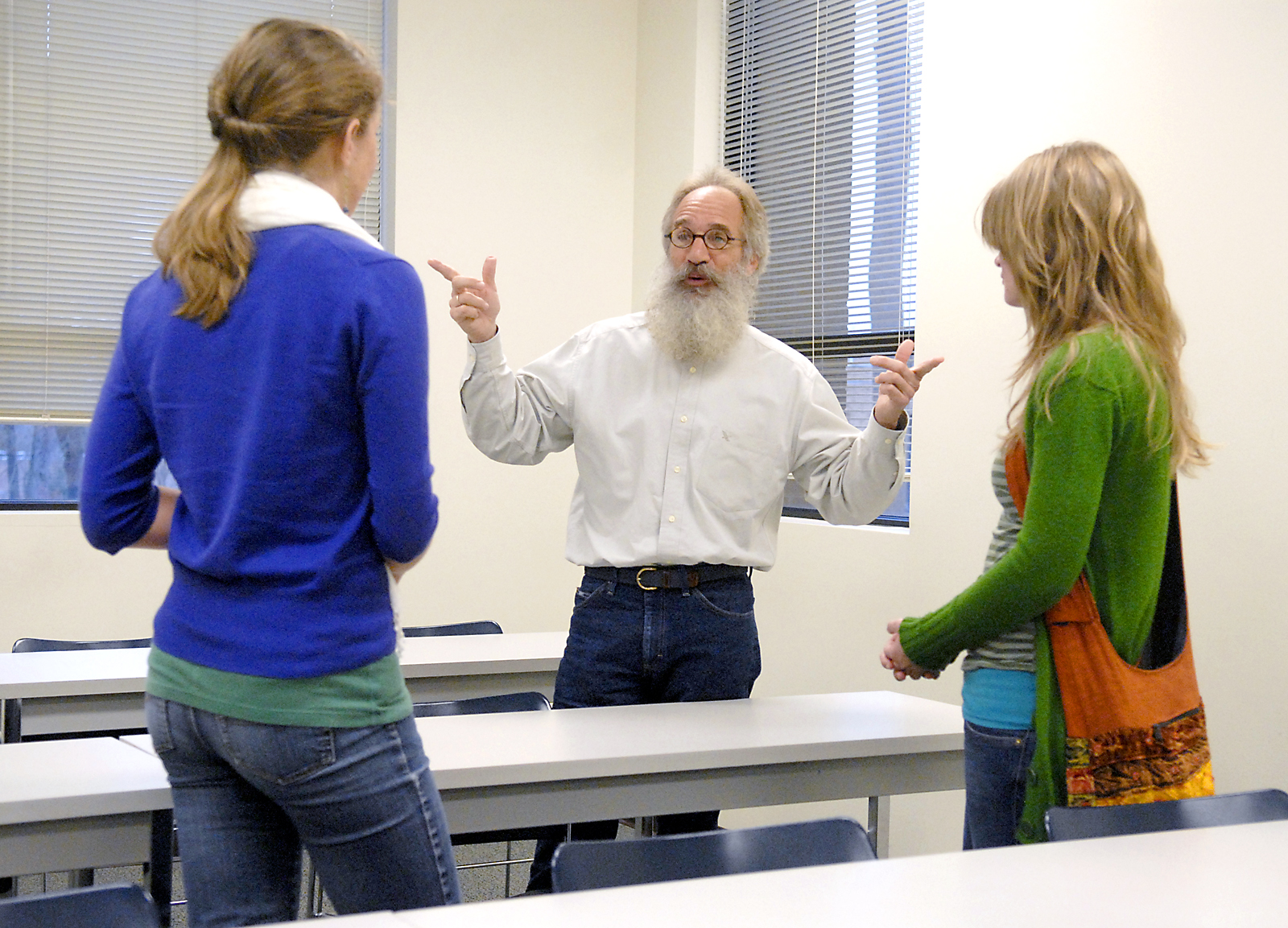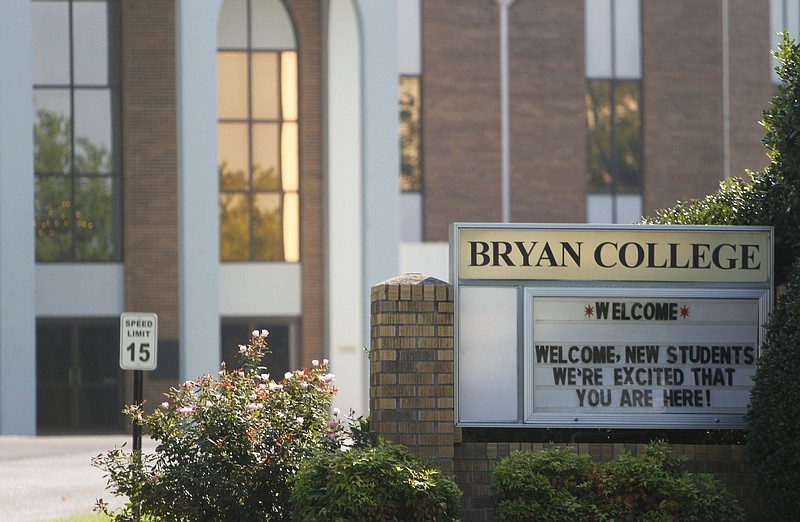 Staff Photo by John Rawlston/Chattanooga Times Free Press - Dr. J. Daryl Charles, director and senior fellow of the Bryan Institute for Critical Thought and Practice, center, talks Wednesday with Bryan College alumnae Carolyn Candland, left, and Bryan senior Pamela Simpson at the campus. On Friday and Saturday, Dr. Charles is leading the college's symposium on the role that Christianity and the Bible play in modern psychology. Ms. Candland returned to the college from her home in Florida to attend the event.
Staff Photo by John Rawlston/Chattanooga Times Free Press - Dr. J. Daryl Charles, director and senior fellow of the Bryan Institute for Critical Thought and Practice, center, talks Wednesday with Bryan College alumnae Carolyn Candland, left, and Bryan senior Pamela Simpson at the campus. On Friday and Saturday, Dr. Charles is leading the college's symposium on the role that Christianity and the Bible play in modern psychology. Ms. Candland returned to the college from her home in Florida to attend the event.It was for this express purpose that I was invited, in the spring of 2008 while serving as a visiting fellow in religion and public life at Princeton University, to Bryan College to become director of the Bryan Institute for Critical Thought & Practice. Though unfamiliar with Bryan, I was familiar with other Christian liberal arts institutions in east Tennessee. My older son was a graduate of Covenant College, and my younger son at the time was headed off to King College (now King University) in Bristol.
As it would turn out, there emerged a number of striking parallels between King, where my son was studying, and Bryan, where I was serving. Reports of financial challenge and faculty dissatisfaction with administration were surfacing at both schools. Those from King, however, were not merely the exaggerated imaginings of my son; they were coming from several friends who were long-standing, well-respected professors there.
At both King and Bryan, faculty morale problems seemed to be rooted in the same source. Administrative leadership had become increasingly reactive rather than proactive, resistant toward faculty governance and dismissive of points of view that appeared to threaten the status quo. The majority of faculty had lost trust in their respective presidents due to an increasingly autocratic leadership style.
At King, an online petition in 2013 to King's Board of Trustees signed by more than 500 college alumni criticized a "loss of vision and academic integrity." Reports surfaced shortly thereafter of professors who had questioned the college's administrative leadership being forced to relocate elsewhere around campus. Three of these were abruptly dismissed.
At the same time, however, a robust coalition of concerned alumni and students, dissenting faculty and informed board members was growing. (Remarkably, King students had set up a Facebook page called "We Are Not Asleep" with an estimated readership of about 10,000.) These efforts were assisted by several former trustees who had been "encouraged to resign" and who were instrumental in helping to override institutional barriers placed between trustees and faculty by the administration.
Tensions at King reached their climax in February 2014 following a faculty no-confidence vote toward the president (62 against, 30 for, 9 abstaining). The no-confidence vote took place on Feb. 10, a Monday. On Thursday, King's president tendered his resignation, ending what for many was a season of deep angst.
Though by no means identical, the difficulties at King and Bryan seem to share a common root. As the Times Free Press recently reported, at Bryan the relationship between the faculty and the president has steadily deteriorated. Significant developments since 2012, as the Times Free Press recounted, are neither unrelated nor occurring in a vacuum. That resignations were strongly advised of several members of the board of trustees who disagreed with the president is particularly telling since holding the college's administration accountable is one of the most important responsibilities of any board.
"The intimidation of both professors and trustees, the lawsuits, as well as the recalcitrant nature of the administration all sound painfully familiar," one King professor recently acknowledged.
Perhaps most disheartening about Bryan's current state since the 2014 faculty no-confidence vote is the administration's systematic purging of dissent. Such has been the cause of sadness among alumni, faculty and staff, former employees as well as former donors. And when criticism from the outside is aimed at the college, the administration simply brushes it off and counters, "Well, this is the price that we must pay for being faithful."
Alas, institutional hemorrhaging suggests perhaps the opposite, coupled with a lack of competence and lack of accountability at the highest level. Doubtless many alumni grieve today as what once was a noble institution becomes increasingly discreditable. It is clearly no accident that the 2015 stewardship report "Private College Financial Health Grades" published by Forbes assigned to Bryan College a "D" grade.
Surely, some readers of this commentary will question my motivation for writing, choosing to view me as a troublemaker. But the truth is quite the contrary. I write with a heart deeply burdened for the health and well-being of King and Bryan. And I write not only because of a unique connection to both schools but out of an appreciation and deep affection for both institutions.
Indeed, Bryan and the legacy of its namesake deserve better. It is for this reason that the example of King University beckons, where the truly faithful, to their everlasting credit, decided that enough was enough. In the wake of fresh and responsive administrative leadership, King's better days are ahead, not behind. With a sense of sobriety - as deep sadness gave way to joy - King knows the wisdom of the ancient proverb: There are three things which cannot remain hidden - the sun, the moon and the truth.
J. Daryl Charles serves an affiliated scholar with the John Jay Institute and teaches in the Chattanooga Fellows Program. A 2013-2014 visiting professor in the Honors Program at Berry College, he is author, co-author or co-editor of 14 books.
